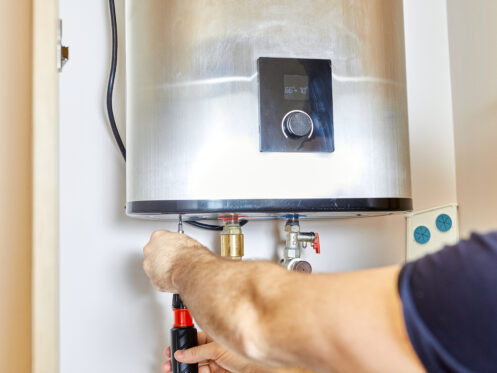Tankless water heaters are among the hottest trends in home water heating. If sized well for a home, they can provide households with a virtually unlimited hot water supply. Another appealing aspect of on-demand systems is that they’re energy efficient. They don’t have to consume energy to keep water hot, but a common consumer concern is whether electric models use substantial energy.
Even Fuel-Burning Units Use Electricity
All tankless water heaters use some electricity. This is true even for fuel-burning systems. That’s because tankless water heaters don’t have standing pilot lights. They have electronic ignition systems, which is becoming increasingly common with gas tank units too. Many systems also need power for LCDs, indicator lights, smart features, and so forth. That said, the electricity usage for these purposes is relatively insignificant.
Electric Units Use a Lot More
Electric tankless water heaters use electricity for ignition. They also use it to power a heating element. That’s what heats the water as it passes through the heat exchanger. Whether a unit uses a lot of electricity depends on the flow rate at any given time. Another factor is temperature rise, which is the difference between the cold and hot water temperatures. The sharper the rise, the more electricity the system must use to achieve the same flow rate.
Uniform Energy Factor
Efficiency varies from one model to the next. There can be two models that both provide 5 gallons per minute, but one uses more electricity than the other. The industry measures this using the uniform energy factor. UEF is a standard metric that measures how efficiently a water heater converts energy into heat. The higher the UEF, the less electricity the unit will use.
Tankless vs. Tank
If you’re upgrading from a standard electric tank water heater, an electric tankless system will use less electricity. The Department of Energy estimates up to 34% less. That’s if you use about 41 gallons of hot water a day, which is average. The more you use, the energy savings can drop to as low as 14%. Note that heat pump water heaters are different. They use heat pumps rather than heating elements and consume less electricity than tankless systems.
Efficiency vs. Cost
Electric water heaters are more efficient than fuel-burning water heaters. While true, it doesn’t tell the whole story for most homeowners. Natural gas and liquid propane are generally much cheaper than electricity. That means fuel-burning systems are usually more affordable to run. With tankless systems, the exceptions are small households with low hot water demands.
EnergyGuide Label
All water heaters in the U.S. must have a yellow EnergyGuide label. It will provide you with the UEF along with estimated annual costs based on the national average electricity rate.
ENERGY STAR
The EPA doesn’t currently give ENERGY STAR certification to electric tankless water heaters. That generally means they’re not eligible for rebates and tax credits. That has drawn industry criticism, and the EPA may reconsider in the future.
Limescale
Water hardness refers to the amount of calcium and other minerals in your water. Due to heat and water stillness, calcium can leach out of your water and form limescale. Scale is problematic for all water heaters but on-demand systems in particular. The water builds up on the heat exchanger and other components. That leads to increased electricity consumption in electric models. You should have your plumber descale your water heater at least once a year and more often if needed. If you have hard water, you may want to consider additional equipment. You can add an anti-scale device to the water heater. A more comprehensive solution is to install a whole-house water softener.
Other Maintenance Considerations
Tankless water heaters require annual maintenance. Without it, wear and tear will accumulate and lead to increased energy usage. Descaling is one necessary maintenance task, but there are others. That includes a multi-point inspection, cleaning or swapping out air and water filters, and testing the temperature and pressure relief valve.
Learn More About Tankless Water Heaters in Stafford
Smooth Plumbing is a locally owned and operated plumbing company serving residential clients in Stafford and throughout Northern Virginia. Our licensed plumbers install and service tankless and tank water heaters. We pipe and repipe water, sewer, and gas lines. You can count on us for drain cleaning and leak detection. We also specialize in all kitchen and bathroom fixtures. Request service online, or call today to learn more about our products and services.

